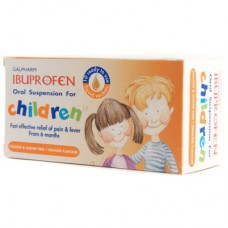Expiration date: 09/2025
Active ingredient: ibuprofen (ibuprofen)
Dosage form
The drug is allowed to use as a means of non-prescription IBUPROFEN
rect symposiums. (for children) 60mg: 10 PCs.
reg. ? : LP-000778 from 29.09.11-Current
Product form, composition and packaging
Suppositories rectal for children white or almost white, smooth, torpedo-shaped.
Auxiliary substances: solid fat, 516 mg. of 5 PCs. - packaging sells contoured (2) - packs of cardboard.
1 supp. contains:
ibuprofen 60 mg
Indications:
Used in children from 3 months to 2 years as:
- antipyretic agents in acute respiratory diseases, influenza, childhood infections, post-privative reactions and other infectious and inflammatory diseases accompanied by an increase in body temperature,
- painkiller for pain syndrome of mild or moderate intensity, including headache and toothache, neuralgia, pain in the ears and throat, pain for ligament injuries and other types of pain.
Dosage regimen:
Ibuprofen-suppositories specially designed for children. The drug is used rectally.
Fever (fever) and pain: the dosage for children depends on the age and body weight of the child. A single dose is 5-10 mg/kg body weight of the child 3-4 times / day. The maximum daily dose should not exceed 30 mg per kg of body weight of the child per day.
Children aged 3-9 months (5.5 kg-8.0 kg): 1 suppository (60 mg) 3 times within 24 hours after 6-8 hours, no more than 180 mg/day.
Children aged 9 months-2 years (8.0 kg-12.5 kg): 1 suppository (60 mg) 4 times within 24 hours after 6 hours, no more than 240 mg/day.
Postimmunization fever: 1 suppository for children under 1 year of age, after 1 year, if necessary, another suppository after 6 hours.
Duration of treatment:
- no more than 3 days as a antipyretic agent,
- no more than 5 days as an anesthetic.
If fever persists, consult your doctor. Do not exceed the stated dose.
Side effect
When applying the drug side effects are rare, but the possible occurrence of the following side effects:
From the digestive tract: nausea, vomiting, discomfort, or pain in the epigastric, laxative effect, possible occurrence of erosive-ulcerative lesions, bleeding.
Allergic reactions: skin rash, itching, urticaria, exacerbation of bronchial asthma, angioedema, anaphylactoid reactions, anaphylactic shock, bronchospasm, fever, multiform exudative erythema (including Stevens-Johnson syndrome), toxic epidermal necrolysis (Lyell's syndrome).
From the nervous system: headache, dizziness, psychomotor excitation, insomnia.
From the side of cardiovascular system: tachycardia, increase in blood pressure.
From the side of blood: anemia, thrombocytopenia, agranulocytosis, leukopenia.
From the urinary system: impaired renal function, cystitis.
If these or other side effects occur, discontinue use of the drug and seek medical advice
Contraindications to use
- bronchial asthma, urticaria, rhinitis, provoked by taking acetylsalicylic acid (salicylates) or other NSAIDs,
- the presence of a child ulcerative lesions of the gastrointestinal tract,
- active gastrointestinal bleeding,
- inflammatory bowel disease,
- confirmed hypokalemia,
- blood diseases: anticoagulation, leukopenia, haemophilia,
- renal and / or hepatic insufficiency,
- depression of hearing,
- hypersensitivity to ibuprofen, acetylsalicylic acid or other NSAIDs, as well as to other components of the drug.
With caution:
You should consult your doctor before using the drug if the child:
- takes other pain medication,
- has a history of peptic ulcer disease, gastritis, ulcerative colitis, gastrointestinal bleeding,
- suffer from diseases of the liver or kidneys,
- takes indirect anticoagulants (drugs for oral administration, reducing blood clotting), medicines for lowering blood pressure, glukokorticosteroida, antiplatelet agents, diuretics (drugs to increase urination), drugs lithium, methotrexate,
- suffers from bronchial asthma, urticaria.
Application for violations of liver function
With caution in diseases of the liver. Contraindicated in liver failure.
Application for violations of renal function
With caution in diseases of the kidneys. Contraindicated in renal failure.
Use in children
Applied in children from 3 months to 2 years
Overdose
Overdose problems occur very rarely, but if you accidentally exceed the recommended dose, contact your doctor immediately.
Symptoms: abdominal pain, nausea, vomiting, headache, rapid eye movements (nystagmus), shortness of breath, blueness of the lips and tip of the nose, bradycardia, tachycardia.
Drug interaction
Simultaneous use of Ibuprofen with antikoagulyantami can lead to the strengthening of their actions.
Ibuprofen increases the concentration of digoxin, phenytoin, methotrexate, lithium in plasma while using these drugs.
The use of ibuprofen with diuretics and antihypertensive agents reduces their effectiveness.
Do side effects of mineralokortikosteroidy and corticosteroids.
Conditions of supply of pharmacies
Without a prescription.
Storage conditions and terms:
The drug should be stored in a dry, dark place at a temperature not exceeding 25°C. Keep out of reach of children. Shelf life-2 years.


